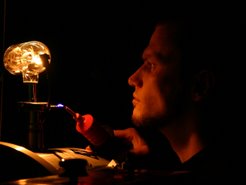Anyway, with Anathem Stephenson is back in style, and back to writing Science Fiction. The book embodies the best Science Fiction can be: A big idea, a gripping yarn and marvelous characters. It tells of a society where all scientists have retreated into convents, and are forbidden from practicing most of the technical sciences. No genetic manipulation, no computer science, no experimental physics, for thousands of years. Instead, they are sequestered into four different orders, which only have contact with one another and the outside world for ten days ever one, ten, hundred or thousand years, respectively. The reason for this is to preserve knowledge, even if the secular world descends into barbarism.
But as weird as this may sound, this is not the novel's Big Idea. Or rather, it is only one of several big ideas. Another has to do with quantum physics and consciousness, and with the Anthropic Principle, and yet another with the viability of long-term organisations and planning. The book is fairly brimming with ideas, yet they do not detract from the story, only add to it. And - quite surprising for a story that reminded me of Eco's The Name of the Rose for the first few chapters - there is also space ships and EVA-battles in earth's orbit.
Did I like it? Well, let me put it this way: I read Anathem on my iPhone (which incidentally makes for quite a good ebook reader) after having it, ahem, acquired on the internet. I just placed an order for it with Amazon though, because this is a book I just have to have sitting on my bookshelf. Right next to the Baroque Cycle, come to think of it. Maybe I should try and have another go at that.


No comments:
Post a Comment